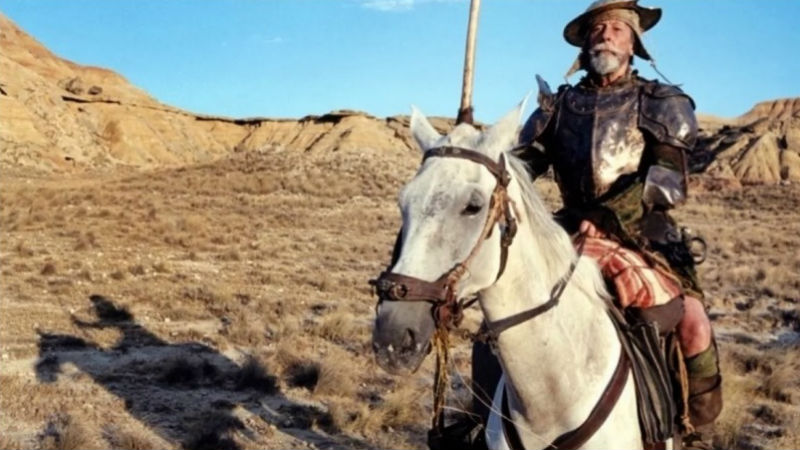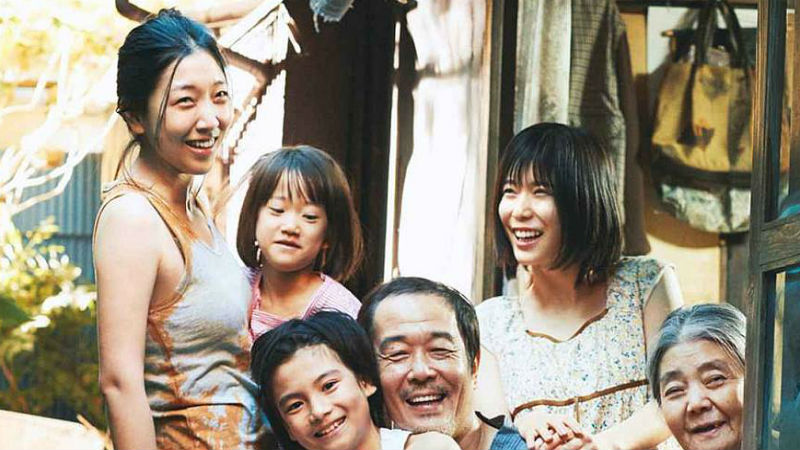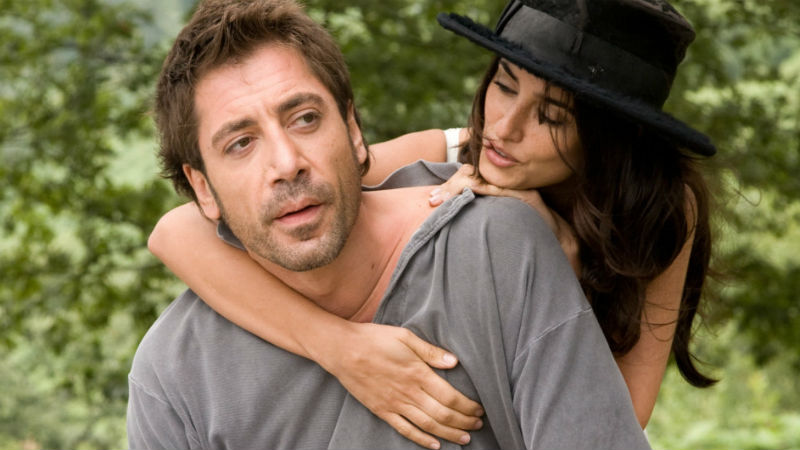The year of 2020 has been like no other, and every single film event had to adapt. The BFI London Film Festival (LFF) is no exception, as the British capital (and the rest of the nation) grapples with the new lockdown rules and restrictions, which have either prevented or discouraged people from leaving their homes in order to go to the cinema. Of course every cloud has its silver lining, and the good news is that all films are now within reach of anyone in the UK, not just the country’s capital.
Throughout the course of 12 days, 14 feature films and a featurette (Almodovar’s The Human Voice) will available to watch in cinemas, namely the three cosy theatres of the BFI Southbank. Plus 59 feature movies are available on BFI Player at specific time slots (which range from a few days to a few hours). They include 50 virtual premieres. You can see the full list and book your tickets by clicking here. In addition, there is also a short film, XR, immersive art and an augmented reality installation – just click here for more information.
Below are our top 10 picks from the programme. They are dirty movies that we watched earlier this year at the Berlin, the Venice and the San Sebastian International Film Festival (the Spanish festival embraced the entire selection from the cancelled edition of Cannes). They are some of the most innovative, provocative and downright filthy that we have seen this year. Of course we haven’t covered every single film in the LFF programme, so stay tuned for more dirty gems throughout the British Festival!
The 10 dirty movies below are listed in alphabetical order. Just click on the film title in order to accede to each individual review:
.
Mustafa (Ali Suliman) and his wife Salwa (Lama Zreik) live 200 meters apart in villages separated by the West Bank Wall. When he receives a call from his wife saying his son has been rushed to hospital, he’s denied access at the Israeli checkpoint on a technicality. Leaving him with no choice, he pays a driver to smuggle him to the other side of the wall. Mustafa alongside a small group of strangers come to depend on one another, as they undertake the dangerous 200 kilometre odyssey.
.
2. Another Round (Thomas Vinterberg):
A history professor, a school music director, a children sports coach and a psychology teacher walk into a bar. They’ve decided to test the theory that mankind should maintain a 0.05% blood alcohol concentration in order to maximise their potential and achieve greatness. Two glasses of wine for kick-off and then top it up throughout the day. You already know where this is going but it’s an intoxicating ride through Sazerac-sodden highs before the crashing hangover sets in. The four male protagonists won the Best Actor prize at San Sebastian. Another Round is also pictured at the top of this article.
.
The king of slow cinema is back, and he’s in great shape. In his latest movie, two men carry on with their lives as normal on the streets of Taipei. One of them (Anong Houngheuangsy) is young and poor, and prepares a meal in his humble dwelling. The other one (Lee Kang) is a little older and seemingly wealthy, judging by the hotel room that he hires. This is where they meet. The conversations are sparse and wilfully “unsubtitled”. The younger man gives the older man a sensual massage, which gradually develops into full-on sex. The action is delicate and sensual, with a palpable sense of intimacy. The two characters develop a bond, helped by the quietly effervescent chemistry between the two actors. There’s also a touch of tenderness. The older man gives a tiny music box to the young one, which appears again in the end of the movie. The two men are inextricably linked through their memories, embodied by the unusual trinket.
.
4. The Human Voice (Pedro Almodovar):
Breaking up with your ex is never an easy task, particularly when he’s already found a new companion. He hasn’t returned home for three days, in a rather unambiguous sign that he has now left for good. You experience a lot of feelings: despondency, jealousy, hate and – first and foremost – rage. You want to stab his chest. You want to cut him up with an axe. You want to set fire to what once was your love nest.
Can you live out these things for real? Probably not a good idea. So the 70-year-old Spanish filmmaker found a cunning solution. He staged the entire action. He built a mock home inside a large warehouse and hired Tilda Swinton to play the jilted lover. She is supported by her doting pooch Dash, dazzling costumes and a jaunty music score by Alberto Iglesias. Almodovar’s latest movie places a 1928 play by Jean Cocteau in a modern context.
.
5. Never Gonna Snow Again (Malgorzata Szumowska/ Michal Englert):
Zenia (played by British Ukrainian actor Alec Utgoff) heals the pains and afflictions of the bored and sick Polish bourgeoisie. He lives in a small flat in town, and spends most of his time – massage-bed under his arm – on an upper class district, visiting very different clients. A woman struggles with an unsatisfactory sex life and an unruly daughter. A man is dying of cancer. An old lady is very sad and lonely, in the company of her three bulldogs. And so on. The young and attractive foreigner is a masseur, a healer, a hypnotherapist, a dancer, a friend and a lover, sometimes all at once.
Never Gonna Snow Again is a highly elliptical film. It’s a collection of allegories, some perfectly intelligible, some deeply personal and moot to interpretation. There is a apparent reference to last sequence of Tarkovsky’s Stalker (1979), as a young Zenya uses telekinesis in order to move a glass across the table. Some sequences feel very creepy/ Lynchian, such as an exotic peep show dance (watched by Zenya) and a magic trick on stage (inexplicably performed by Zenya alongside one of his clients). All strangely delectable.
.
What was intended to be an ostentatious celebration soon turns into a bloodbath, in the movie that won the Silver Lion of Venice. Twenty-five-year-old, pretty and Nordic-looking Marianne (Naian González Norvind) is getting married to the handsome, Italian-looking Alan (Dario Yasbek Bernal). Both families and their rich friends have united at her family’s spectacular dwelling, somewhere in Mexico City. Everyone is dressed to kill, and food and drink are abundant at the extravagant party. Until their conspiring employees open the house gates to trigger-happy, ruthless rioters.
This is no Marxist revolution. The rebels are profoundly consumerist, wide-eyed with greed, as they steal the expensive electronics, jewels and other valuables from their hapless victims. They take enormous pleasure in vandalising the property. They are not concerned about equality. Instead they work in cahoots with local authorities and other groups. Their allegiance is as fragile as the champagne glasses at the wedding party. Nihilism and factionalism prevail. There is no concern for social justice. They are prepared to betray and to kill their associates without hesitation. They just want money. As much money as possible.
.
Fern (Frances McDonald) is a beautiful and intelligent middle-aged woman. She is very unusually charming, with her quiet and stern smile. She is also in perfect good health. Someone who could be working in Wall Street. Instead she lives in poverty in the back of her van (not a camper van, but a regular size one), travelling across her large nation in search of temporary employment in fast-food restaurants, factories and so on. She literally has to “handle her own shit”, in reference to the bucket that she uses as a toilet. The movie that won the Silver Lion at Venice is based on Nomadland: Surviving America in the Twenty-First Century, a non-fiction work penned three years ago by Jessica Bruder.
.
8. Shirley (Josephine Decker):
In the year of 1964, the highly reclusive horror writer Shirley Jackson (Elizabeth Moss) and her husband Stanley (Michael Stuhlbarg) “welcome” two graduate students into their Vermont mansion, Rose (Odessa Young) and her spouse Fred (Logan Lerman). Rose and Fred are vibrant, optimistic and full of life. Shirley are cruel and offensive misanthropes. Shirley will attempt to hurt and humiliate the naive couple at every opportunity. Her equally unpleasant husband will support her in the very questionable endeavour.
Shirley wasn’t just a reclusive, who rarely ever left her large estate. She was also a sociopath. In the few occasions when she ventured out of her property, she helped to ensure that everyone in her surroundings felt threatened and mortified. Her actions included the the sharpest and meanest remarks, pulling scary faces and spilling wine on the sofa. Her gaze overflowing with hate and envy. She has Bette Davies eyes, complete with the bitchiness of Margo Channing in All About Eve (Joseph L. Mankiewicz, 1950). The difference between between Davis’s character and Shirley is that the latter is genuinely cold-blooded and brutal.
.
9. Supernova (Harry Macqueen):
Tusker (Stanley Tucci) has received a diagnosis of dementia, causes and stage unknown. Things are definitely worsening, however, this simply won’t do for author Tusker, renowned for his intellectualism and lively personality. Concert pianist partner Sam (Colin Firth) is stoically resigned to tackle the coming challenges and is considering easy access bungalows or outside help. His heart is completely dedicated towards this new goal to spend their remaining time together. “Every moment”. The two are not entirely on the same page, with the sentimentality of Sam’s approach rubbing against the more clinical outlook of Tusker, railing at the inevitability of becoming a passenger in his own body. The diametrically opposed personal introspection of the writer against the sensitivity of an outwardly performative musician has until now defined their relationship, now causing friction.
.
10. Undine (Christian Petzold):
Undine (Paula Beer) is an eloquent historian. She teaches tourists about the architectural history of Berlin in a local museum. She shows them a giant model of the city as it currently is and another one of what it would look like now had the GDR not unexpectedly collapsed 30 years earlier. Her life is also seeing a very abrupt change: her lover Johannes (Jacob Matschenz) is about to dump her. The nonchalant yet assertive female has threatened to kill him in case he proceeds with his plans. She does not wish to see their romance confined to the past, just like urbanistic plans for the defunct communist state.
She then meets the handsome Christoph (Franz Rogowski), a diver familiar with the underwater secrets of the German capital. The grounded lady and submarine gentleman complement each other. They meet entirely by accident (literally), in one of these rare occasions when the underwater world comes crashing into the surface. Undine was unwittingly waiting to submerge into Christoph’s world for some time. Her name is a reference to a 200-year-old German novella about a water spirit.













